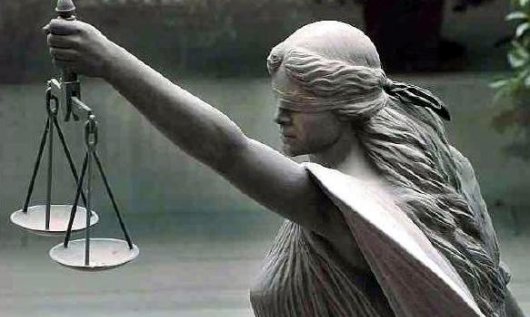The state vs. the citizen

Patriotism, respect for law, and allegiance are demands placed upon the citizen by the state. Such awesome authority, being capable of misuse, should always have to justify itself. Does the state accept this small burden? The responsibility of the citizen is to insist upon it. But how? And through what medium?
It is commonly suggested that power ultimately lies with the people, through the medium of the ballot box. But by the time people get to the ballot box, the choices have already been made, offering an either/or proposition. Since both political parties are wedded to the furtherance of the national security state, this amounts to aggression abroad and repression at home. Aggression is always illegal and repression is always immoral.
The Nuremberg example still lies before us. One can’t simply state that they were just following orders. The Nazis wouldn’t have survived a day without some Germans obeying orders from the state. Legal orders! The ultimate decision for the individual is not whether to vote or not, but whether to obey or not. The harshest policies adapted by any dictator or president — like assassinating, torturing, detaining without due process, persecuting whistleblowers, rounding up immigrants, jailing asylum seekers, separating families — only become harsh because people obeyed, instead of disobeying.
You’ve got to hand it to the United States government. Invading, bombing, and overthrowing foreign countries while claiming to spread democracy. Now that’s a neat trick. Patriotic slogans, closer to shibboleths (…a word or saying used by adherents of a party, sect, or belief and usually regarded by others as empty of real meaning) such as, freedom isn’t free, support the troops, honor our veterans, and God bless America, rely on a certain set of assumptions. Namely, that the state is benevolent, that it is moral, and that it acts as a whole to represent the goodwill and common interests of ordinary people.
The purpose of a marketing slogan is to create, in the target host, a suspension of the critical thought process. Its success as a strategy is complete when the host is unable or unwilling to seek an alternative. The tethering of the host to the sloganeer presents an imbalance of power, creating a vulnerability. Patriotic sloganeering makes the citizen into a host, tethered to the state. When the citizen is sufficiently prepared through propaganda, the state has enormous leverage.
The dissident view on patriotism is that the state exploits the goodwill of its citizens into a double cross, rallying them into battle and support for war, adoration of the military, and vilification of refuseniks while concealing its true purposes. This is beyond politics and generalizes to all states. States are, by degree, adversaries to the people in them.
The universe works well as a metaphor for the state, a cold amoral entirety with a few warm spots here and there. The warm spots are necessary to appeal to the benevolent and altruistic side of humankind, without which the state as a ruling body would lose legitimacy. The job of the state is to keep the double cross operative by throwing in those exploitable warm spots amidst the cold amorality.
So goes the step of the capitalist, imperialist state baiting its young men and women to fight continuous war, prepared to sacrifice them while hiding behind the figurative skirts of “support” and “honor”, and for those not paying the ultimate price in “freedom isn’t free”, thanking them for their service with 10% off.
Another shibboleth, nobody is above the law (Aside: What if the law is beneath all of us?) is used to keep ordinary people from breaking the law under the pretense that all are subject to it. We’re all in the same boat. The “law” is presented as a rigid body when in practice it is infinitely flexible. Since this flexibility is everywhere evident, for instance, some people clearly being over and beyond the law, there’s nothing left for the state to do but lock up small people as continuous examples.
We can derive a general principle here: The higher your station, the more you get away with. The lower your station, the less you get away with.
In this case, station is not only associated with wealth and social standing. The police and the military enjoy special status as agents of the state, as are those that act in other capacities as agents.
The special principle is: The higher your value to the state, the more you get away with. The lower your value to the state, the less you get away with.
The shibboleth, we are a nation of laws, is devoid of content because what arrangement of society has ever been without them, even transmitted orally? The continual harping about this is more an indication of its disproof in much the same way as privacy promises were unnecessary when it existed.
We pledge allegiance to the flag for two reasons. So we remain that way, and so that we can be prosecuted when we don’t. This is not the way individuals may see it, but it is the way the state sees it. And what is supposed to happen when the republic is not allegiant to its people?
The Declaration of Independence, written in self-serving fashion (all men were not c(t)reated equal, let alone women), lays it on the people to alter or abolish their government whenever it is destructive of their unalienable rights. Though unalienable is an imprecise term, we can sense the distance between a government run by, for, and of the people and the one we really have, purposefully set up to insulate itself, contemptuous of little people, and thoroughly in the hands of a capitalist elite.
James Rothenberg writes on U.S. social and foreign policy.
jrothenberg3@gmail.com
jrothenberg3@gmail.com

0 Comments:
Post a Comment
Subscribe to Post Comments [Atom]
<< Home